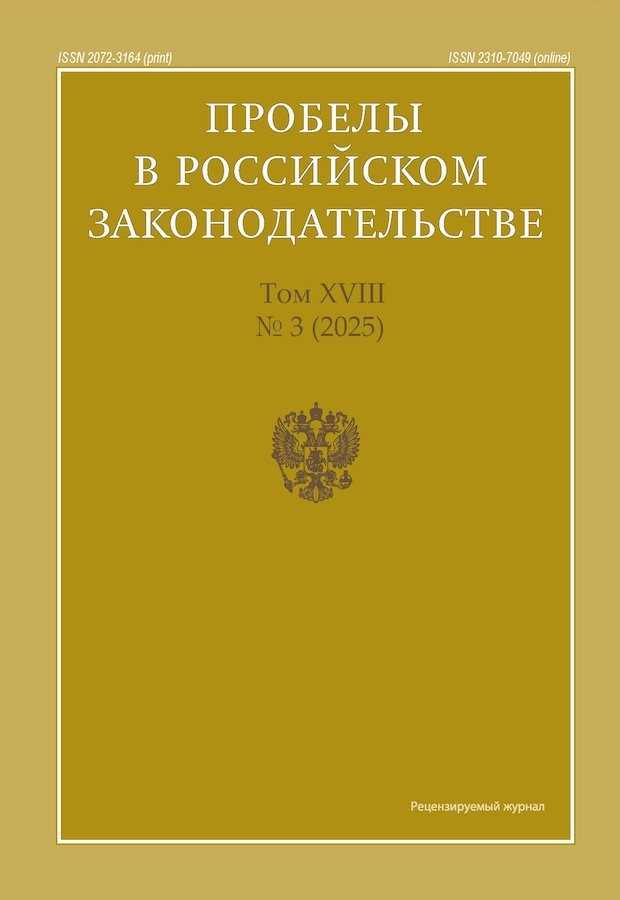Digital educational platforms in modern Russian legal regulation (some features of terminology)
- Autores: Pogodin A.V.1, Turov G.S.1,2
-
Afiliações:
- Kazan (Volga region) Federal University
- Talent and Success Educational Foundation
- Edição: Volume 18, Nº 3 (2025)
- Páginas: 35-43
- Seção: Theoretical and Historical Legal Sciences
- URL: https://journals.eco-vector.com/2072-3164/article/view/687920
- DOI: https://doi.org/10.33693/2072-3164-2025-18-3-35-43
- EDN: https://elibrary.ru/EXWCUQ
- ID: 687920
Citar
Resumo
The purpose of the research. In modern society, such a social phenomenon as digital educational platforms is gaining a significant place. In Russia, two social trends can be identified in the field under consideration: on the one hand, online training («motivational») courses are being distributed from individuals and, in particular, bloggers, who are negatively assessed in society both from the perspective of ethical norms and from the perspective of law, on the other hand, business entities, Interested in a high-quality product in a competitive environment, they develop their own educational platforms, providing access services to the latest or paid educational services in relevant professions in the field of information technology, design, artificial intelligence, game design, etc. The latter is in the legal field, the state seeks to regulate the specified area. Nevertheless, there are relatively few studies on the legal regulation of this social phenomenon. In order to ensure the availability of comprehensive studies on the legal regulation of digital educational platforms, it is necessary to identify cases of official use of the term by the legislator and its meaning, and, if possible, provide recommendations, which is the purpose of this study. Results. Research article identifies approaches in which digital educational platforms can be considered, examines legal definitions, provides recommendations for further research and legal work, and defines the necessary theoretical guidelines for this.
Palavras-chave
Texto integral
Sobre autores
Alexander Pogodin
Kazan (Volga region) Federal University
Autor responsável pela correspondência
Email: aleksandr.pogodin@kpfu.ru
ORCID ID: 0000-0002-2569-9095
Código SPIN: 5124-7458
Dr. Sci. (Law), Prof., Professor Department of Theory and History of State and Law
Rússia, KazanGeorge Turov
Kazan (Volga region) Federal University; Talent and Success Educational Foundation
Email: george.turov@mail.ru
ORCID ID: 0000-0003-1556-707X
Código SPIN: 5768-8973
postgraduate student, Kazan (Volga region) Federal University; Leading Legal Adviser, Talent and Success Educational Foundation
Rússia, Kazan; Sirius Federal TerritoryBibliografia
- Dewi P. I., Srisudarso M. Legal Regulation on the Use of Online Learning Platforms: Challenges and Solutions in Indonesia. P.L. Dewi, M. Srisudarso.International Journal of Language and Ubiquitous Learning. 2024. No. 2 (2). Pp. 217–226.
- Sakshi S. Uncovering legal Issues Involved in E-learning Platforms. S. Sakshi. Sakshar Law Associates, India. 2021. Pp. 1–8.
- Tian Y. Research on Legal Regulation of Internet Platforms. Y. Tian. Theoretical and applied jurisprudence. 2023. No. 2 (16). Pp. 8–15.
- Tokoshov R., Alieva M.A., Rasulzhan kyzy, Z., Abdukakharova, T. Makambai, M. Legal regulation of digital platforms for recreational physical education in the Kyrgyz Republic. R. Tokoshov, M.A. Alieva, Z. Rasulzhan kyzy, T. Abdukakharova, M. Makambai . BIO Web Conf., XIII International Scientific and Practical Conference MBFA 2024. 2024. Vol. 120. Pp. 1–10.
- Anikin B. A., Rudaya I.L. Outsourcing and outstaffing: high technologies of management: a textbook. 4th ed., ispr. and add. B.A. Anikin, I.L. Rudaya. Moscow: INFRA-M, 2022. 313 p.
- Broy Sh. U. The negative impact of the crisis caused by the Covid-19 p.ndemic on ensuring children’s right to education. Sh. U. Broy. Lawyer. 2022. No. 1. Pp. 33–36. (in Rus.).
- Glushko I.V. Social practices as a socio-philosophical problem. I.V. Glushko. Concept. 2018. No. 2. Pp. 82–86. (in Rus.).
- Gordeeva A. D., Guseva A.A. Strategic planning and legal regulation of activities in the field of road safety in Brazil. A.D. Gordeeva, A.A. Guseva. Road safety. 2024. No. 2. Pp. 64–70. (in Rus.).
- Mikhailova E.V. Digitalization of professional legal activity and the educational process: the concept and development trends. E.V. Mikhailova. Economy and Law. 2022. No. 7. Pp. 96–111. (in Rus.).
- Pogodin A. V., Krasnov E. V., Putintsev A.V. Actual problems of legal regulation of democratic practice (foundations of the concept of the Code of Democracy). A.V. Pogodin, E.V. Krasnov, A.V. Putintsev . Uchen. zap. Kazan. University. Series. Humanitarian Sci. 2021. Vol. 163, book 2. Pp. 7–16.
- Gaps in law in the context of digitalization: a collection of scientific papers. D.R. Alimova, S.A. Afanasyeva, L.T. Bakulina et al.; under the general editorship of D.A. Pashentsev, M.V. Zaloilo. Moscow: Infotropik Media, 2022. 472 p.
- Stozhko K.P. The crisis of the university as a center for the formation of knowledge: in search of a way out. K.P. Stozhko, D.K. Stozhko, A.V. Shilovtsev, S.N. Nekrasov, V.N. Sinko. Education and Law. 2024. No. 2. Pp. 348–354. (in Rus.).
- Tikiji A.E. The impact of the digitalization process on the social environment in Russia. A.E. Tikiji. State power and local self-government. 2024. No. 8. Pp. 46–49. (in Rus.).
- Chubarov I. M., Artemenko N.A. The crisis of university education in Russia: causes and consequences (materials of the Round Table). I.M. Chubarov, N.A. Artemenko . Bulletin of the Leningrad State University named after A.S. Pushkin. 2011. No. 2 (1). Pp. 271–282.
- Shugalsky S.S. Social practices: interpretation of the concept. S.S. Shugalsky. Knowledge. Understanding. Skill. 2012. No. 2. Pp. 276–280. (in Rus.).
Arquivos suplementares









